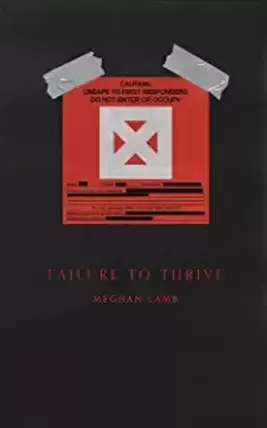“Failure to thrive” is the medical term used for the slow development of an infant due to a lack of nutrients. Babies who receive this diagnosis will often have developmental delays later in life. This condition can be the result of an internal, chromosomal issue or the environment around the child. In either case, death is imminent unless there is interference. Meghan Lamb’s debut novel, Failure to Thrive captures that slow process and the inability to thrive in settings that produce nothing but death and decay. The story takes place in a Pennsylvania coal town poisoned by an underground fire. Divided into three sections, it centers around three families: a young couple struggling to raise a neurodivergent daughter, a woman caring for a dying parent and dealing with the after-effects of her past substance abuse, and a young man dealing with memory loss after a catastrophic accident. Lamb uses genre-bending prose, vivid imagery, and subtle characterization to highlight the major themes of her novel. In each section, readers follow each of the characters into a slow decline. We watch their lives fall apart as they struggle to overcome their situations. The spaces that they occupy generate an atmospheric sense of emptiness, a feeling that the prose’s design replicates. There is something wonderfully haunting about Lamb’s prose and the strategic way she arranges the words on the page. Readers who pick up this book will likely first notice the short snapshots that make up each chapter and the text that drifts across the page like whispers of smoke. She lets sounds speak for themselves; spelling out every “cooroo” (19) of the birds and “Kkkkkk-AHHHH” (131) of a dying man’s cough so that it can be felt. She gives life and voice to the words and sounds that make up the character’s world until you can’t help but feel them move through you.
Lamb doesn’t capture her characters’ decline through grand, dramatic scenes of conflict or action. Instead, it’s the subtle, unsettling details of mundane experiences that encapsulate this slow process of decay and death. In the first section, the narrator introduces Olivia, a woman who is neurodivergent and trying desperately to stick to her daily schedule in the absence of her parents. Lamb contrasts Olivia’s lonely present with her parents’ thriving past, the life they lived before they had her. This contrast only sharpens Olivia’s loneliness and hunger as she waits for a breakfast that never comes. It is accentuated by a single, heartbreaking description: “Her stomach feels like a long-forgotten basement” (26). Lamb sprinkles descriptions like this throughout the novel, effectively highlighting the absences that loss and trauma leave behind. With Helen, Lamb takes simple pleasures like enjoying a meal with a parent and turns them into something sickening. Forced to thicken and blend everything her father drinks and eats, Helen serves him water that is “the consistency of honey” and is “pale yellow sick and smells like sulfur.” (143). A desire to relive her childhood and enjoy their favorite shared treat of ice cream with dark chocolate bits results in dissatisfaction. With Jack, his life is a blend of odd-tasting pills and life with loved ones he can’t fully remember. The stilted dialogue and awkward pauses transform family dinners and a night out with the boys into an unfamiliar place. Connecting them all is the fire that speaks in italics and breathes its poisonous smoke into the town, disrupting seasons and their way of life. While the characters grapple with survival and hang over the edge of death, the fire remains constant, the only remaining witness of what was once a thriving town. What Lamb takes the time to describe is just as important as what she leaves out. Readers can expect to finish this novel with questions still lingering in the back of their minds. What happened to Olivia’s mother? How did Helen really lose her job? Will Jack ever recover his memories and what has he forgotten? To enjoy this book, you have to be prepared to exist in uncertainty. Lamb trusts her readers to fill in the details she omits and read into the under-running stories the existing narratives hint at. Failure to Thrive shows us how quickly the little things in life—the disappointments, the mistakes, the choices we make—pile up over time. How little control we sometimes have over our environments and the things that make us. How life has to be desired and fought for, and just how hard that fight can be at times.
0 Comments
Leave a Reply. |
Archives
July 2024
Categories
All
|
|
Glassworks is a publication of Rowan University's Master of Arts in Writing 260 Victoria Street • Glassboro, New Jersey 08028 [email protected] |
All Content on this Site (c) 2024 Glassworks
|


 RSS Feed
RSS Feed
